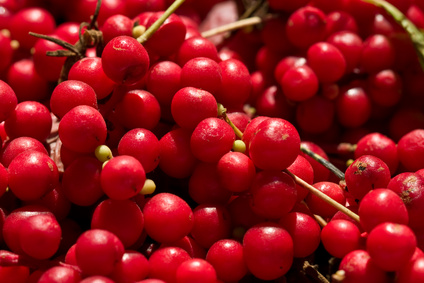Schisandra chinensis a small red fruit from a large bush that is native to China. The schizandra fruit tastes a bit salty, bitter, sweet, hot, and sour. Because of the mixture of tastes, the Chinese named the fruit wu wei zi which means five taste fruit. Schisandra contains a wide variety of biologically active compounds, which, working in syntony, create its medicinal effects.
Schizandra Benefits
Schizandra has been used to increase the body’s resistance to stress, increase stamina, stimulate the immune system, and decrease fatigue. Active ingredients including lignans, vitamins and phytonutrients in Schisandra chinensis provide a normalizing effect on the body. As documented by the Health Sciences Institute, schizandra raises the body’s amount of the enzyme glutathione. Enhanced glutathione production enabling healthy cell growth, balance and energy production.
Adaptogenic
Schizandra demonstrates significant adaptogenic activity. Research in the late 1940s by Russian scientists confirmed that schizandra berries is an adaptogen. By bringing a balance or a homeostatis to the organs the use of Schizandra is responsible for a harmonious condition to spread in the body. Schizandra may help to reduce fatigue, improve endurance, improve work performance, and build strength. Schizandra is promoted for its stimulating effects on the nervous system without being excitatory like amphetamine or caffeine. In Russia it has been used for increasing attention, concentration, coordination, endurance, and strength. Schizandra, a remedy that reduces the effect of stress on the body by reducing the production of stress hormones from the adrenal glands. A recent study concluded that Schizandra may be a useful herb to help reverse depression, particularly that due to adrenal exhaustion.
Antioxidant
Schizandra protects against free radical damage. Increases the activity of superoxide dismutase and catalase. Provide powerful antioxidant protection, from free radicals and other toxins in the environment that may cause cellular damage. Recent studies have shown that it is a potent antioxidant that exerts a beneficial effect on the mitochondria—the powerhouse within every cell.
Liver
 Schizandra has been shown to strengthen and protect the liver. Laboratory studies have demonstrated its ability to make the enzyme, glutathione peroxidase, which deactivates several kinds of toxic free radicals that attack the outer membranes of liver cells. It protects liver cells from oxidative damage and raises the capacity of liver to deal with drugs and their harmful metabolites during first pass metabolism. Schizandra uses its fat soluble compounds found in the core of its seed to protect the liver from toxins. In 1986, Chinese researchers reported more than 5,000 cases of various types of hepatitis have been treated with Schizandra preparations, resulting in the reduction of elevated liver enzymes. Lignans have been found to lower blood levels of serum glutamic pyruvic transaminase (SGPT), a marker for infective hepatitis and other liver disorders. According to researchers, elevated SGPT values returned to normal in 75 percent of patients treated after 20 days of taking an unspecified Schizandra preparation. Japanese scientists have shown that two Schizandra lignans have powerful hepato-protective effects, even against compounds as toxic as carbon tetrachloride.
Schizandra has been shown to strengthen and protect the liver. Laboratory studies have demonstrated its ability to make the enzyme, glutathione peroxidase, which deactivates several kinds of toxic free radicals that attack the outer membranes of liver cells. It protects liver cells from oxidative damage and raises the capacity of liver to deal with drugs and their harmful metabolites during first pass metabolism. Schizandra uses its fat soluble compounds found in the core of its seed to protect the liver from toxins. In 1986, Chinese researchers reported more than 5,000 cases of various types of hepatitis have been treated with Schizandra preparations, resulting in the reduction of elevated liver enzymes. Lignans have been found to lower blood levels of serum glutamic pyruvic transaminase (SGPT), a marker for infective hepatitis and other liver disorders. According to researchers, elevated SGPT values returned to normal in 75 percent of patients treated after 20 days of taking an unspecified Schizandra preparation. Japanese scientists have shown that two Schizandra lignans have powerful hepato-protective effects, even against compounds as toxic as carbon tetrachloride.
Brain
Schizandra is brain tonic that helps in increasing the brain capacity. Researchers at the Department of Pharmacology, Chinese Academy of Medical Sciences, Beijing, found that two lignans in schizandra inhibit the swelling and disintegration of brain mitochondria, reducing the possibility of brain damage from stroke and aging. A study published in 2009 in of the Journal of Traditional Chinese Medicine and Pharmacy found that schisandra helped improve energy metabolism in the brain after clinically induced cerebral ischemia.
Aphrodisiac
For both men and women, schizandra is considered an aphrodisiac. Schizandra affects men by stimulating semen production, boosting libido, extending erection time and preventing premature ejaculation. Many women claim increased genital warmth and sensation after using Schizandra for a period of time.
Schizandra Dosage
Take 300-900 mg of standardized extract or 1-6 grams of Schizandra berries 2 times a day. The tincture of Schizandra is also available, take in the amount of 2-4 ml thrice daily. Tea: Pour a cup of boiling water onto 1-2 teaspoonfuls of the bark and leave to infuse for 10-15 minutes.
Schizandra Side Effects
Schizandra is generally safe in recommended doses. But may cause appetite loss and mild stomach upset. Schizandra in larger amounts should be avoided by persons with peptic ulcers or epilepsy. Pregnant or breastfeeding women should not take Schizandra, as it may induce uterine muscle contractions.
Leave a Reply